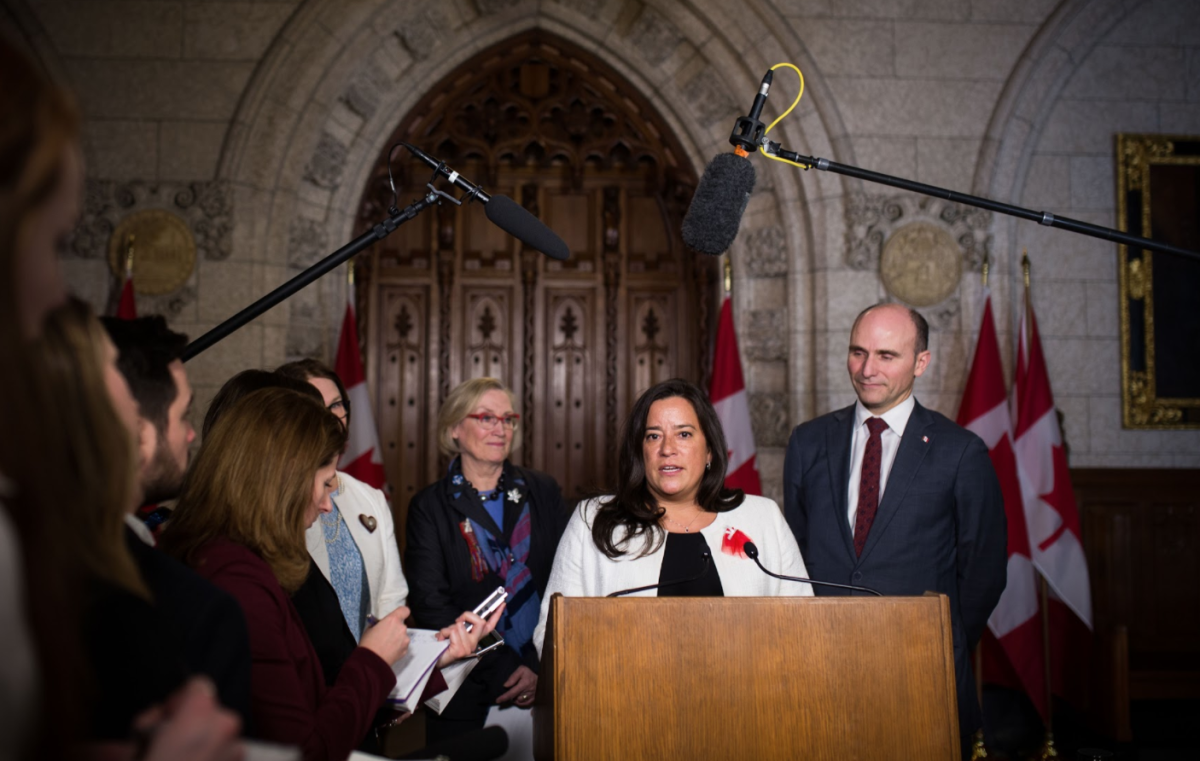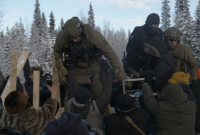Support strong Canadian climate journalism for 2025
Prime Minister Justin Trudeau's shifting of cabinet minister Jody Wilson-Raybould makes him appear tone deaf to Indigenous concerns.
Wilson-Raybould was Canada’s first Indigenous minister of justice and attorney-general. A first-time MP representing the riding of Vancouver Granville, she was just the third woman appointed attorney-general of Canada.
Trudeau shuffled her to the much less prominent position of minister of veterans affairs. He also moved Jane Philpott from Indigenous Services to the Treasury Board. Newfoundland and Labrador MP Seamus O’Regan replaced Philpott and Montreal MP and lawyer David Lametti replaced Wilson-Raybould.
The rationale for the cabinet shuffle earlier this month was Nova Scotia MP Scott Brison's decision against running in the next federal election to spend more time with family and to step down as president of the Treasury Board meantime.
With a federal election looming in the fall, the timing and direction of the shuffle casts doubt on Trudeau’s own pledge that “no relationship is more important to me and to Canada than the one with Indigenous peoples.”
Just a week before the cabinet shuffle, RCMP officers in B.C. arrested 14 members of the Wet’suwet’en Nation who violated an injunction by blocking access to the Coastal GasLink natural gas pipeline project. The hereditary chiefs say they were asserting their governance system and laws over their territory, which was never ceded to Canada.
First Nations leaders are speaking out against Trudeau’s cabinet shuffle.
The First Nations Leadership Council, a group of B.C. First Nations leaders, expressed concern that the shuffle “signals a wavering commitment to addressing Canada’s colonial history and to realizing a true nation-to-nation relationship with Indigenous peoples.”
The departures of both Wilson-Raybould and Philpott don’t bode well for upcoming policy reform of Aboriginal title and self-determination and child-welfare reform, said Cheryl Casimer, political executive member of the First Nations Summit organization that represents most First Nations and tribal council in B.C.
“(It) signals that the Prime Minister is no longer committed to reconciliation and reforging Canada’s relationship with Indigenous Peoples, as a priority,” Casimer said in a news release.
Grand Chief Stewart Phillip calls Canada's relationship with Indigenous peoples 'deplorable'
Grand Chief Stewart Phillip, president of the Union of B.C. Indian Chiefs, was even blunter.
“The removal of these critical and well-respected ministers, during a period of significant conflict and tension, demonstrates Trudeau’s lack of resolve to address Canada’s deplorable relationship with Indigenous peoples,” Phillip said in a release.
“The Prime Minister has made a very clear decision to completely abandon the reconciliation agenda in favour of supporting business and industry in terms of oil and gas infrastructure development and similar projects.”
The Indigenous Bar Association, a group of Indigenous lawyers, scholars and academics, said the move calls into question the Trudeau government’s commitment to reconciliation.
“With the federal election looming, relieving a strong Indigenous advocate from her duties as the Justice Minister is a monumental symbol of the Liberal government’s lack of commitment to the meaningful recognition of Indigenous rights and interests,” the Indigenous Bar Association said in a news release.
Wilson-Raybould is from the Musgamagw Tsawataineuk and Laich-Kwil-Tach people of northern Vancouver Island, who are part of the Kwakwaka’wakw people. Her father is the hereditary chief of her clan, the eagle clan.
Before entering politics, she was a prosecutor in Vancouver’s Downtown Eastside and later regional chief of the Assembly of First Nations for British Columbia.
The CBC reported that some people said Wilson-Raybould could be dismissive and confrontational, but others, like six Indigenous judges who wrote an opinion piece in the Globe and Mail, say she is “determined, collaborative and hard-working.”
The judges say she was not hard to work with. “She had high expectations of herself and others, because she was focused on seeing real change, especially in the work of reconciliation.”
Wilson-Raybould has not shied away from telling it like it is. A couple of recent speeches show her willingness to speak out on Canada’s shortcomings, even as a member of the parliamentary inner circle.
Wilson-Raybould says she challenged others constantly as Attorney-General
In September 2018, in a speech to the University of Saskatchewan, she said she had been challenged in her role.
“…But I also challenge constantly. And I will continue to do that every day I have the privilege to be the Minister of Justice and Attorney-General of Canada,” she said.
In that same speech, she said words are cheap when they’re not backed up by real action.
“The path of justice and equality is not advanced or achieved through half-measures, good intentions, or lofty rhetoric,” she said. “And it is certainly not achieved through obfuscation or confusion about what we mean when we speak.”
In another speech, delivered in Ottawa in October, 2018, Wilson-Raybould spoke of being vulnerable in her role.
“Indeed, in my own experience serving as the first Indigenous person to be Canada’s Minister of Justice and Attorney-General, I have unfortunately had it reinforced that when addressing Indigenous issues, no matter what table one sits around, or in what position, or with what title and appearance of influence and power, the experience of marginalization can still carry with you,” she said.
“But this does not deter me. It only makes my resolve stronger and more determined.”
Her comments suggested she was stymied in her work.
When reporters asked whether Wilson-Raybould was demoted, Trudeau said, “I would caution anyone who thinks that serving our veterans and making sure that they get the care to which they are so justly entitled from any Canadian government is anything other than a deep and awesome responsibility.”
Wilson-Raybould released her own statement, which said she wouldn’t comment on the shuffle, but would comment on her work as Minister of Justice and Attorney-General, which she called one of the greatest privileges of her life.
She was pressed to respond to the appearance of demotion: "I would say that I can think of no world in which I would consider working for our veterans in Canada as a demotion," she said.
She says the social and economic realities faced by Indigenous people, like a lack of clean drinking water, inadequate housing, overrepresentation in the criminal justice system, high rates of poverty and violence against women and girls, are linked to regimes that have “disempowered and divided Indigenous peoples, eroded their systems of governance, laws, and responsibilities, harmed their economies, and denied their basic rights and systems.”
Wilson-Raybould may have been speaking generally, but it's also possible those comments referred to the arrests just one week earlier at the Wet’suwet’en blockade.
And Wilson-Raybould's statement said: “Long overdue legislative and policy changes based on the recognition of title and rights, including historic treaties, are urgently needed, so that Indigenous peoples can accelerate and lead the work of rebuilding their Nations and governments, and a new climate of co-operative relations can emerge.”
Wilson-Raybould's new laws have changed Canada for the better
The Indigenous people of Canada lost a strong advocate in one of the country’s highest offices, but the work Wilson-Raybould had already done will live on.
No one can take from her the fact she was the first Indigenous person to serve as attorney-general of Canada, and she will always be the minister of justice who brought in two landmark pieces of legislation that will change Canada forever, and for the better: the legalization of cannabis, and medical assistance in dying. Those two major legal reforms that were brought in with little trouble.
Wilson-Raybould also overhauled the appointment process for federal judges and appointed a diverse group of 250 judges across the country.
More than half of those appointments are women, while eight are Indigenous, 22 are members of visible minorities, 12 identify as LGBTQ2S, and three are people with disabilities. These appointments will continue to influence the law in Canada for decades to come.
While it’s a shame Wilson-Raybould was not allowed to finish what she started as Canada’s first Indigenous attorney-general, her legacy will live on.
Tracy Sherlock writes about B.C. politics for National Observer. Reach her with tips and comments at [email protected].





Comments
The medical assistance in dying legislation is a botched half-measure, which betrayed a landmark Supreme Court decision.
Shame on Wilson-Raybould!
Clearly PM was not pleased that Wilson-Raybould was moving toward substantive changes in the Canadian justice sytem that is still operating largely in the old family compact, colonial mold. Trudeau needs to define clearly his intentions if he want's to walk his poetic talk.
I don't share the view that Wilson-Raybould legacy warrants much praise. As stated by another commentator, her medical assistance in dying legislation is both a human and constitutional travesty. It's now before the courts, and I hope it's struck down as the betrayal it truly is to people in need of dignity and compassion in death.
As well, Wilson-Reybould made commitments to modernize Canada's century-old, inadequate animal cruelty provisions in the Criminal Code after the defeat of Bill C-246 at the hands of the Liberals. She betrayed that commitment and produced nothing of note.
Under Wilson-Reybould, the Department of Justice has been actively engaged in trying to diminish and limit rights, and never to enhance them. Any improvement in rights under Wilson-Reybould and Trudeau--from the right to vote for Canadians living abroad to charities engaging in political activities--only came about in response to court decisions and never due to their own initiative. Neither Wilson-Reyboud nor Trudeau have shown themselves to be champions of rights either in Canada or elsewhere, despite their rhetoric.
Whatever praise Wilson-Reybould's career might deserve, her tenure as Justice Minister, in particular, is, in my view, not a mark of distinction or accomplishment.